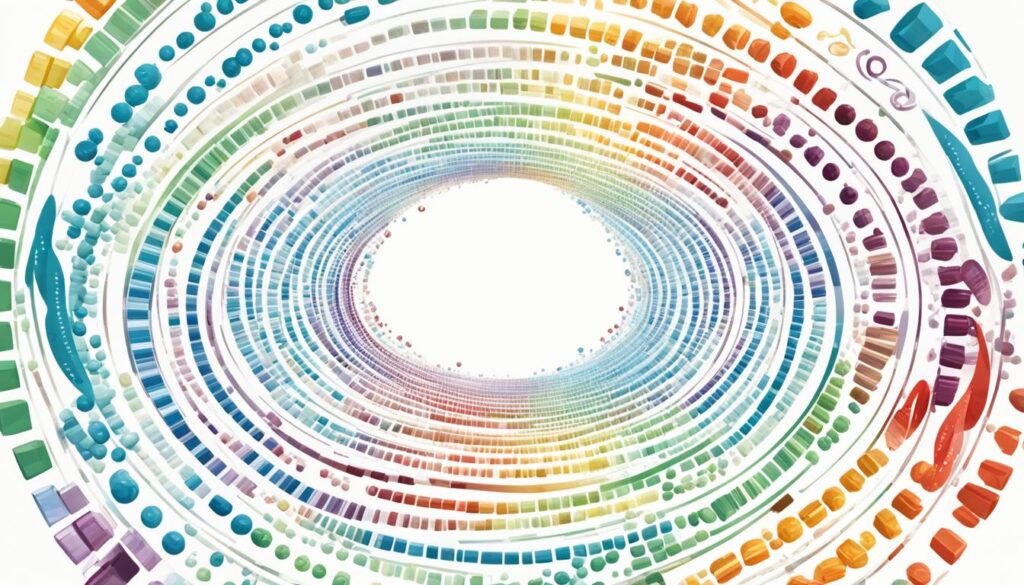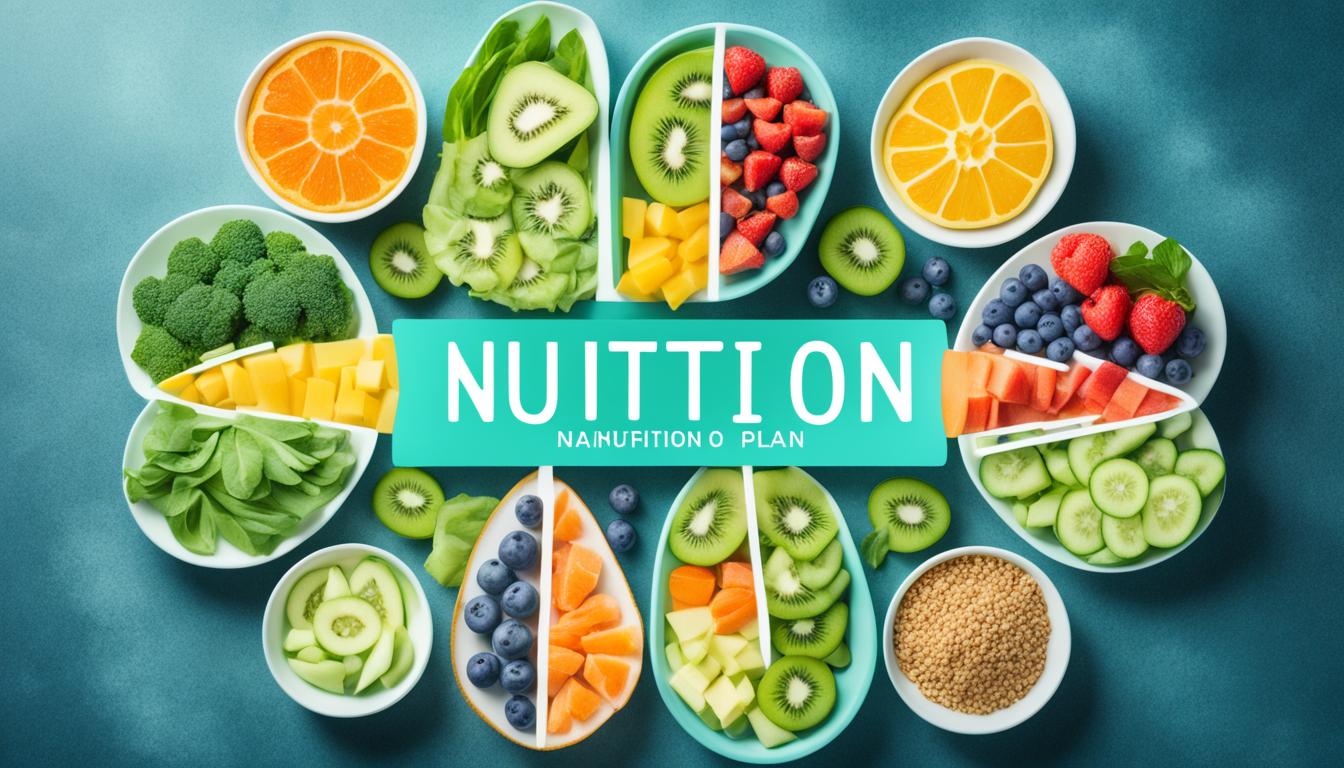Tired of diets that don’t seem designed for you? Personalized nutrition plans could be the answer. These plans match your unique health needs. Personalized nutrition isn’t just general advice. It’s guidance crafted specifically for you and your health goals.
Big studies have found that personalized nutrition works better than a one-size-fits-all approach.1 Using ZOE’s at-home tests, you can check your blood and gut health. Then, you get advice on which foods are ideal for your body. This helps you reach your health and nutrition targets.1
Key Takeaways
- Personalized nutrition plans are tailored to your individual needs, unlike generic dietary guidelines.
- Studies show personalized nutrition plans lead to greater improvements in diet and health compared to one-size-fits-all advice.
- ZOE’s at-home tests analyze your unique biology to provide personalized food recommendations.
- Personalized nutrition plans can help you achieve your personal health and nutrition goals.
- Incorporating personalized nutrition into your lifestyle can lead to sustainable, long-term health benefits.
What is Personalized Nutrition?
Personalized nutrition looks at your unique traits to suggest what foods are best for you.1 It uses big data and machine learning to know things like your health history and how your body reacts to food. This way, it aims to boost your well-being based on your individual needs.1
Tailoring Dietary Advice to Individual Needs
Research shows that what works for one person may not work for another, even if they are twins.1 By learning how your body responds to different foods, experts can offer advice that suits you, considering things like genes and lifestyle.1
Considering Genetics, Lifestyle, and Health History
Personalized nutrition takes all about you into account, like your genes and daily routines.1 This approach offers tailored tips to improve your diet and health, aligning with what fits you best.1
Moving Beyond One-Size-Fits-All Dietary Guidelines
Standard dietary advice doesn’t always consider your personal needs.2 Personalized nutrition breaks from this, giving advice meant just for you. This can lead to better health progress and easier following of your diet plan.1
The Science Behind Personalized Nutrition
The field of personalized nutrition, known as nutrigenomics, studies how our diet and genes interact. It combines nutrition, genomics, and biology. By exploring these connections, scientists learn how certain foods can change gene activity.3 This understanding is then used to create personalized dietary advice. The goal is to make this advice more effective than general ones. It helps tackle public health challenges by fitting advice to each person’s genetic makeup.
Nutrigenomics: The Study of Gene-Diet Interactions
Nutrigenomics looks at how diet and genetics interact, affecting gene activity and metabolism.3 Through this study, we learn about genetic differences in how we react to nutrients. This knowledge is used to make nutrition plans that consider these genetic factors.
Exploring the Impact of Diet on Our Genome and Metabolism
Personalized nutrition focuses on how diet affects our genes and metabolism, depending on our unique genetics.3 It aims to understand how different nutrients can change our genes, affecting our health. These interactions show that diet doesn’t have the same impact on everyone’s genes.
Addressing Public Health Challenges Through Personalized Nutrition
Personalized nutrition is seen as a way to deal with major health issues like chronic diseases.4 By creating diet plans that match personal genetics and lifestyle, we hope to see better health outcomes. This approach is more targeted than general diet advice, focusing on improving health for everyone.
Genetic Testing for Personalized nutrition plans
Genetic testing for personalized nutrition, also known as nutrigenomic testing, looks at how genes affect our response to food.5 It checks certain genetic markers, like single nucleotide polymorphisms. These can show how our body uses nutrients, which diseases we might be at risk for, and more.5
Analyzing Genetic Variations and Their Dietary Implications
Healthcare pros design custom nutrition plans by looking at a person’s genetic blueprint.5 This helps individuals get the right nutrients, tackle health issues, and reach their wellness aims.5
Nutrigenomics vs. Nutrigenetics: Understanding the Distinction
Nutrigenomics and nutrigenetics are related but different. Nutrigenomics studies how diet affects our genes and metabolism. Nutrigenetics looks at how our genetic differences change how we react to food.6 Combining both fields means healthcare providers can make nutrition plans perfect for each person’s genes and diet needs.6
| Study | Year | Focus |
|---|---|---|
| 1 | 2016 | Personalized nutrition covered Fields of precision nutrition |
| 2 | 2016 | Ethics, challenges, and endeavors of precision nutrition |
| 3 | 2009 | Nutrigenomics approaches to functional foods |
| 4 | 2009 | Nutrigenomics in cardiovascular medicine |
| 5 | 2006 | Connection between Nutrigenomics, proteomics, metabolomics, and the practice of dietetics |
| 6 | 2008 | Nutrigenomics research for personalized nutrition and medicine |
| 7 | 2004 | Nutritional genomics |
| 8 | 2010 | Nutriomes and nutrient arrays for personalized nutrition for DNA damage prevention and cancer growth control |
| 9 | 2012 | Randomized trial of genetic information for personalized nutrition |
| 10 | 2014 | Disclosure of genetic information and its impact on dietary intake |
| 11 | 2017 | Precision nutrition approaches for the prevention and management of metabolic syndrome |
| 12 | 1972 | Personalized nutrition counseling |
| 13 | 2013 | Factors influencing European consumer uptake of personalized nutrition |
| 14 | 2018 | Precision nutrition for the prevention and management of type 2 diabetes |
| 15 | 2017 | Systems biology of personalized nutrition |
Interpreting Genetic Test Results for Diet Planning

Figuring out genetic test results for diet is about looking at how our genes change what we eat. These tests show how our bodies take in nutrients, process them, and even what foods we like.7 Dietitians and other health pros are key. They help us see how our genes link to what we should eat. This connects to our tastes, needs, and being healthy.7
Translating Genetic Data into Practical Dietary Advice
Health pros give advice tailored to our genes to lessen health risks. They make sure our diet plans are just for us, making us healthier.3 These customized diets lower bad fats and helped some lower their cholesterol.3 A special diet helped some people lessen how much bad cholesterol they had in a short time.3
The Role of Health Professionals in Interpreting Test Results
7 Rachel Clarkson, a registered dietitian, helps with diets for health and sickness. She uses Nutrigenomics, a science that matches diets to genes, making good diet plans for different needs.7 She works at the DNA Dietitian clinic in London. They make diets based on your genes for problems like weight, women’s health, diabetes, gut issues, and helping people have babies.7
Benefits of Personalized Nutrition Plans
Personalized nutrition plans have many benefits backed by science. They lead to better metabolic health, help with weight management, and lower disease risks.1 Studies like the Habit and Food4Me show these plans can really make a difference.1 People reduce their calorie, carb, and sugar intake. They also cut down on fats and see better body and health results.1 Getting tailored dietary advice makes healthy eating habits easier to stick with.8
Improving Metabolic Health and Weight Management
Personalized nutrition aids metabolic health and weight control.1 80% seeing a 9.4-pound weight drop in 3 months is a major win.1 These plans top the Mediterranean diet in controlling blood sugar too.1 They work by focusing on what’s best for each person, boosting metabolic health and keeping weight in check.8
Reducing the Risk of Chronic Diseases
It can lower the chances of getting chronic diseases, a huge benefit.1 Eating foods that spike blood sugar and fat can up the disease risk.1 Personalized plans, looking at a person’s blood and gut health, offer tips to cut this risk.1
Enhancing Dietary Compliance and Healthy Eating Habits
They also make it easier to stick to good diets.1 In a 6-month program, people did better than those on common advice.1 This method not only teaches about eating right and managing portions but also adjusts for health conditions and likes.8 This makes keeping up with healthy eating over time more likely.8
Limitations and Challenges of Personalized Nutrition

Personalized nutrition faces big hurdles. We don’t fully understand how our genes and diets mix.9 This makes tackling big issues like obesity tough with just one solution.9 Remembering everything we eat and drink is hard.9 This leads to challenges in accurately tracking our diets. But, new tech and better methods are on the rise. They promise to give us more accurate info about what we eat.9
Experts look at these nutrition challenges in a wider view. They talk about food security, especially important in making foods that meet consumer needs.10 One study looked at creating personalized nutrition products and found it’s not easy.10 Even with healthy food plans, not everyone improves the same. This is key for companies making nutritional supplements or better foods.10
The Workshop on Precision Nutrition in August 2021 pointed out why personalized nutrition matters. People just don’t respond to meals the same way.11 Results from the meeting showed some shocking risks tied to our genes. For example, high chance of kidney disease from certain gene types.11 Another finding was how diet doesn’t always match our gut bacteria.11 This shows that one diet plan doesn’t fit everyone.11 Christian Metallo talked about how genes affect disease in MacTel patients.11 MacTel is a disease tied to problems with how our bodies process amino acids.11
Personalized nutrition offers a lot of hope but has a long way to go. We still need to crack how our genes, lifestyle, and diet interact fully. Plus, tracking what we eat accurately is still a major challenge.9 Yet, new tech and better methods are stepping up. They could make personalized diet advice much better.910
Integrating Personalized Nutrition into Healthcare
Personalized nutrition is growing in importance, making its way into healthcare.12 Nutrition experts, like dietitians and nutritionists, are key. They help people understand how their unique genes affect what they should eat.12 They guide in avoiding health issues and offer diet plans just for you. These are aimed to make you as healthy as possible.
The Role of Nutritionists and Dietitians
Nutritionists and dietitians are pivotal in making complex nutritional science easy to follow.12 They look at genetic tests and other customized data to create personalized diet plans. These are designed to meet your specific health and lifestyle goals.12 They use a field called nutrigenomics. This helps people see how their genes affect what foods are best for them. It lets them choose better for their health.
Collaborative Approach with Medical Professionals
Working with doctors and genetic experts is vital to fit nutrition advice to your full health story.12 Together, these experts ensure your diet plan suits your medical needs.12 This teamwork leads to diet plans that work hand-in-hand with your medical care. Nutritionists and dietitians, when they team up with other health experts, make sure their advice is safe and good for your health.
nutrition plans: Tailoring Dietary Guidance for Optimal Health
Customized nutrition plans look at more than just your genes. They focus on giving you the best diet for your health.3 They consider what foods you like and how you live, such as how active you are.13 With tech like apps and special meal planners, you get advice that’s made just for you. This makes choosing and sticking to a healthy diet easier.
Accounting for Individual Preferences and Lifestyle Factors
Not everyone thrives on the same food rules.3 Nutrition plans that take your taste, daily life, and health goals into account are more helpful.13 This personal touch makes it simpler to change eating habits for the better, fitting what you need and like.
Leveraging Technology for Personalized Meal Planning
New tech has changed how we make and use personalized nutrition plans.12 Apps, smart meal planners, and wearables can offer feedback and recipes just for you. They change as your needs and likes do.13 This tech boost means it’s easier than ever to eat well every day.
| Key Insights | Personalized Nutrition Plans | Generic Dietary Guidelines |
|---|---|---|
| Dietary Adherence | 13Significant increase in adherence rates | Lower adherence rates |
| Nutrient Absorption | 1315% improvement in efficiency | Lower nutrient absorption |
| Weight Management | 1312% reduction in weight | Less effective for weight loss |
| Metabolic Health | 1310% improvement in metabolic markers | Limited impact on metabolic health |
| Chronic Disease Management | 1378% of patients experienced health improvements | Less effective for chronic disease management |
| Personalization | 1392% of patients had unmet dietary requirements | One-size-fits-all approach |
| Precision of Recommendations | 1320% increase in precision with AI and data analytics | Limited precision in dietary recommendations |
| Patient Satisfaction | 1365% reported higher satisfaction with healthcare services | Lower satisfaction levels |
| Efficacy Compared to Traditional Personalized Nutrition | 1325% increase in efficacy with nutrigenomics-based plans | Lower efficacy compared to nutrigenomics-based plans |
| Global Health Impact | 1330% decrease in malnutrition rates, 17% increase in overall health | Limited global health impact |
| Patient Well-being | 1385% of patients reported improved overall well-being and quality of life | Less impact on patient well-being and quality of life |
Case Studies: Success Stories with Personalized Nutrition
Scientific studies show that personalized nutrition plans do work. But what’s more powerful are the success stories from real people. These personalized nutrition case studies show how people improved their health. They did this through better metabolic health, weight management, and dealing with health issues.
Jo lost 9.5kg in just 4 months14. Alice lost 13kgs in a year14. Carla dropped 15kgs in 5 months14. Marie was able to shed 27kgs in just a year14. Leon, who is 51, lost 16kgs with his plan14.
These are just a few of the success stories with personalized nutrition. Nicola overcame perimenopause challenges with her nutrition plan14. After becoming a mother, Lucy lost 12kgs14. Pip, in her 60s, lost 19kgs14. Chris got rid of 16kgs of fat14. Angela, at 54, lost 10kgs in 4 months14.
Sharing these stories on personalized nutrition and success stories can motivate others. These stories show the life-changing impact of personalized nutrition. They prove that it’s possible to improve health and reach personal wellness goals.
Conclusion
Personalized nutrition is a big step forward in health and wellness. It means giving diet advice that fits each person, not a general plan for everyone.15 This new way of looking at health considers how our genes, lifestyle, and what we eat all work together. It’s clear that focusing on personal nutrition can really help us stay healthy and avoid diseases.15 Even though we still have some challenges to overcome, the future of personalized nutrition is looking good. Thanks to new tech16 and a bigger focus on precise health care, things are getting better.16
Choosing personalized nutrition means being more involved in your own health. It also lets doctors and other health experts give advice that really matches each person’s needs.15 This approach is all about using what we know to help people pick better food and be healthier in the end.16
The future of how we eat and stay healthy with personalized nutrition is very promising. There’s a lot of ongoing study, new tech, and a better understanding of why personalized approaches matter so much.15 With personalized nutrition, health care becomes more about the whole person. It’s a step towards a health system that’s really focused on every person’s unique wellness.16
FAQ
What is personalized nutrition?
Personalized nutrition customizes dietary advice to fit your health needs. It looks at things like your health history and how your body responds to food. This personalized care helps you meet your health goals better.
How does personalized nutrition differ from traditional nutrition advice?
Traditional nutrition advice is general, but personalized nutrition is designed just for you. It uses advanced technology and tools to match your health needs with specific data about you. This way, your health goals are met more effectively.
What is the science behind personalized nutrition?
The science behind personalized nutrition is called nutrigenomics. It studies how our diet and genes interact. Researchers in this field look at how different foods can affect our genes.
What is genetic testing for personalized nutrition?
Genetic testing for personalized nutrition looks at your DNA to see how you may react to food. It focuses on how your genes shape your diet needs. This kind of testing dives deep into your genetic makeup.
How are genetic test results interpreted for nutrition plans?
These results are carefully reviewed to see how your genetic details impact your diet. They can tell us about your body’s nutrition needs and even what foods you might like. Nutrition experts help you understand what your genes mean for your diet.
What are the benefits of personalized nutrition plans?
Personalized nutrition plans have a lot of benefits. They can improve your metabolism, manage your weight, and lower disease risks. Plus, they make it easier for you to stick to healthy eating habits.
What are the limitations and challenges of personalized nutrition?
However, there are still things we don’t fully understand about personalized nutrition. There are complex relationships between genes, eating habits, and other lifestyle choices. Plus, keeping an accurate food diary is hard, making some data less reliable.
How can personalized nutrition be integrated into healthcare?
To fully include personalized nutrition in healthcare, it needs to be a team effort. Nutrition experts and medical professionals work together. They ensure your dietary advice matches your health needs and genetic information.
How can personalized nutrition plans be tailored for optimal health?
Creating a personalized nutrition plan involves more than just your genetic makeup. It looks at your food preferences and lifestyle too. Technology helps make these plans easy to follow every day.
What are some real-world success stories with personalized nutrition?
Real stories show the power of personalized nutrition. They highlight how people have seen real health benefits. These stories demonstrate how effective this approach can be for anyone.
Source Links
- https://zoe.com/learn/what-is-personalized-nutrition
- https://foodinsight.org/personalized-nutrition-ready-for-prime-time/
- https://www.rupahealth.com/post/personalized-nutrition-tailoring-diet-plans-to-genetic-profiles
- https://www.news-medical.net/health/What-is-Personalized-Nutrition.aspx
- https://nutrigenomix.com/
- https://www.ncbi.nlm.nih.gov/pmc/articles/PMC8023120/
- https://thednadietitian.co.uk/articles/diet-plan-genetics
- https://b3medical.com/2021/09/10-advantages-of-personalized-nutrition-counseling/
- https://www.futurelearn.com/info/courses/revolutionising-the-food-chain/0/steps/171388
- https://www.ncbi.nlm.nih.gov/pmc/articles/PMC6281760/
- https://www.ncbi.nlm.nih.gov/books/NBK575794/
- https://www.ncbi.nlm.nih.gov/pmc/articles/PMC6081996/
- https://davidboydmd.com/personalized-nutrition-plans-for-optimal-health-by-dr-david-boyd/
- https://nutritionforlife.co.nz/success-stories
- https://www.ncbi.nlm.nih.gov/pmc/articles/PMC7071223/
- https://nap.nationalacademies.org/read/12957/chapter/9

